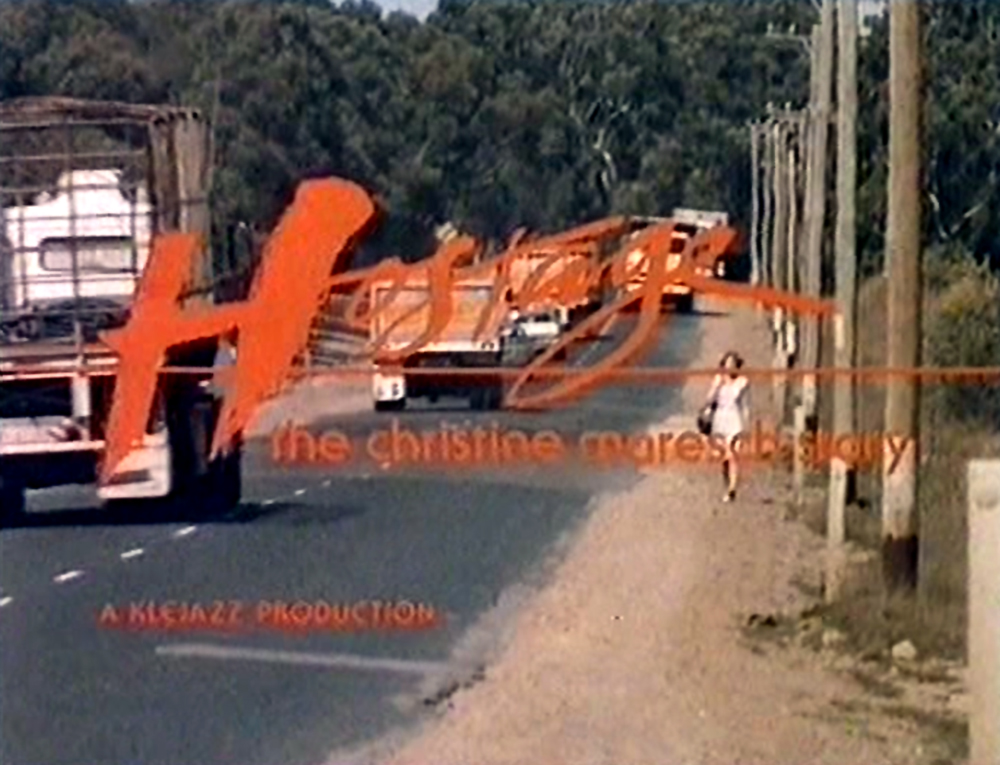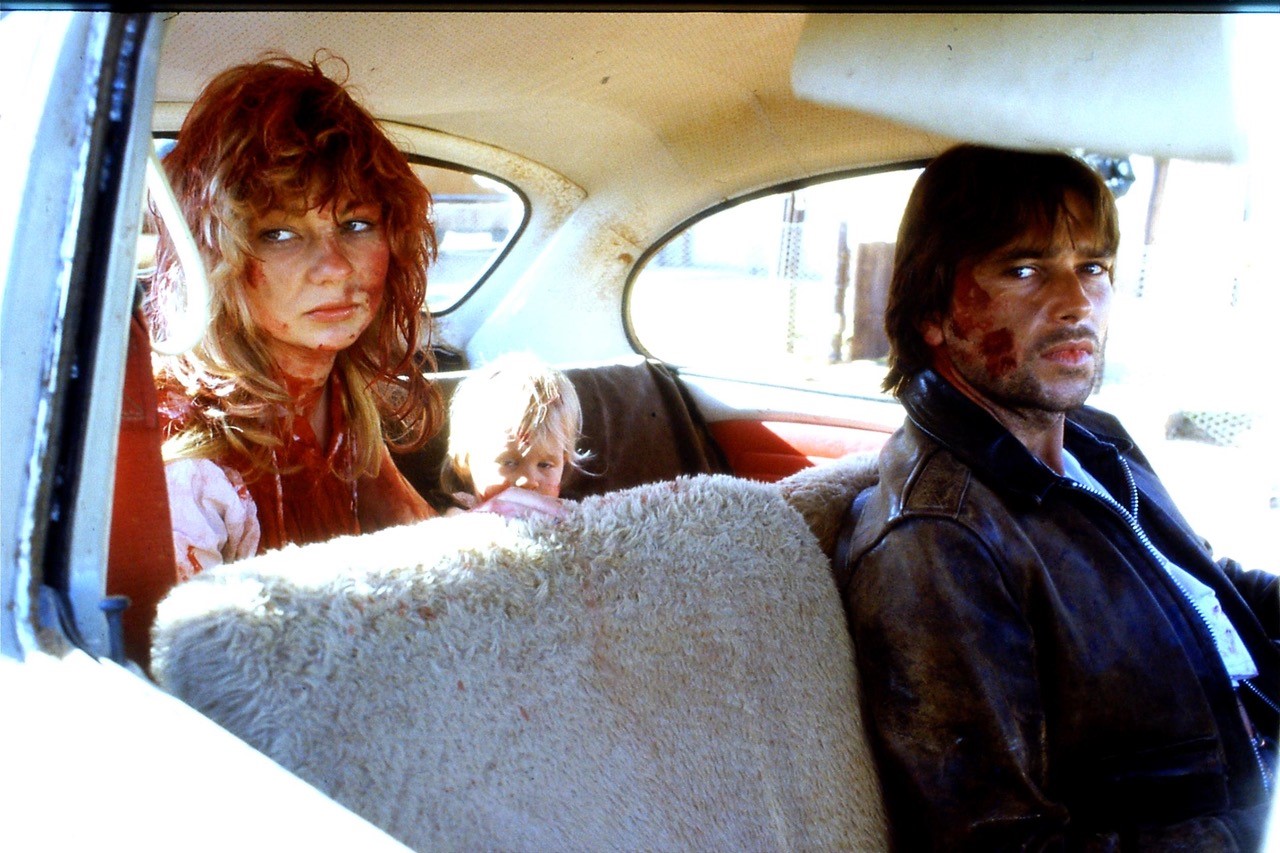The re-emergence of Frank Shields 1983 thriller Hostage (aka Savage Attraction) from Umbrella Entertainment comes at a fascinating time in history. Based on Christine Maresch’s book of the same name, this is the alleged true story of a woman who finds herself in a relationship with a man who hides the fact that he’s a neo-Nazi from her. Both Christine and the film itself are surprised at the existence of Nazi’s in regular society in the 1970’s, moving amongst the community in plain sight, operating in the shadows and manoeuvring themselves for another takeover, of which Christine is just another pawn in the game.
Watching Hostage in 2020, almost three years on from the Charlottesville white supremacist and Nazi rally, and when KKK members freely walk through supermarkets with their hoods on to protect themselves from Covid-19, it almost feels quaint. It’s still a genuinely horrifying tale, one that rolls along at an unsteadily breathless pace, slamming from one year to the next, with event after event recklessly lurching into one another. But, there’s an almost tabloid media-esque presentation to this story, one that feels ripped from the National Inquirer style reporting which thrives on shock stories and unbelievable tales. The click-bait headlines before click-bait was a thing.
Her Husband Was a Nazi… and She Didn’t Know!
She Was Taken to Germany to Raise His Nazi Children
This is part of the reason why I state that this is an alleged true story. In all my searching for this review, all I could find about Christine Maresch (nee Christine Lewis) was in relation to this particular film and a goodreads entry for the book that this is based upon. I couldn’t find any news reports about Christine and the relationship that she had with Walter Maresch (here, portrayed by Ralph Schicha), nor the bank robberies that she was dragged into being an unwilling accomplice for. I want to stress that I’m not suggesting this story didn’t happen, the events are so heightened that it’s hard to feel that they couldn’t have happened to someone, but rather that it’s hard to point to the proof that this narrative took place in Australia.
As with many stories in the world, they fall through the cracks, slipping into history to be forgotten. For some, the only enduring item that exists about something important having happened is a dramatized retelling via a book or a film. That becomes their legacy, instead of the truth of the tale that a news report might have delivered. I only mention this as if this is the only testament of Christine’s life and the trauma that she went through, then it stands as a powerfully potent one that honours her struggles, while also mildly trivialising others.
This doesn’t stop the film from being an impactful film, albeit one with enticingly lurid moments that are atypical of the Aussie new wave era – there’s a fair amount of sultry shot sex scenes which actively work against the traumatic plot –, as well as a fair share of intense violence and taut moments of tension.
Hostage kicks off with Christine hitchhiking in the middle of nowhere, picking up a job at a carnival. Here she meets factory worker Walter, who immediately posits himself as a protector, an alpha-male to fend of all the other alpha-males. Knowing his Nazi-roots going in makes it easier to appreciate why Christine was an easy mark for him – she’s white, blonde haired, blue-eyed, the exact fit for his plan to rebuild a Nazi empire in Germany.
Don Saunders editing makes itself known early, with abrupt time shifts and narrative jumps that brush over major life events and the routine machinations that would often be depicted that help them take place. Within minutes of the film kicking off, Walter is proposing to Christine, with her defiantly stating that she’s not that kind of woman, that’s not the life she wants to live. She has dreams and aspirations, and desires to live a full life unencumbered by a husband and child.
Immediately, Walter threatens suicide if she denies him her hand in marriage, and when Christine calls his bluff and storms out on him, he follows through by shooting himself in the chest. It’s merely an act of entrapment, with Walter manoeuvring Christine to a position that he can easily manipulate her.
Moments later, she’s pregnant, and the two are living with chain-smoking Mrs Lewis (an acidic Judy Nunn), Christine’s mum, who throws barb after barb at both Christine and Walter. Christine for getting pregnant and disrupting her life, and Walter for being an outwardly disturbing individual. We’re afforded precious few moments with Judy Nunn, but the masterfully great actress ensures that every second spent with her is unforgettable. Nunn’s appearance, replete with a half-smoked cigarette in her hand, is initially alarming; this is not the Ailsa Stewart we grew to love and adore. Watching Nunn here made me wish for a career where she wasn’t squirreled away on a soap. Not that there’s anything wrong with that, it’s merely that she’s clearly relishing the awfulness of the character that I can only imagine what kind of performances we would have been blessed with if her acting path followed a different route.
The factory that Walter works at burns down, with Frank Shields confident direction hinting at the notion that this was not quite accidental. With a second baby on the way and Christine declaring she’s going to get an abortion, Walter takes this as a chance to relocate this makeshift family to Germany. Upon arrival in Munich, Walter takes Christine to the weathered remnants of a stadium where Nazi rallies were once held. The mastery of Hostage is quietly revealed here, with Walter standing proud amongst the weed-riddled concrete structure, all the while the sounds of the rallies plays over the empty stadium.
Adding to the nauseating horror of Christine’s new world is the gentle transition from an empty stadium to the grainy black and white footage of the rallies taking place. No, we’re not being presented this as a reminder of what went on there, rather, this is one of the first things that Walter takes Christine to: a screening of footage, surrounding her with an audience of eager Nazi’s celebrating their past, and hoping for a new future driven by their vision.


If there’s a complaint that comes with John Lind and Frank Shields script, it’s how nonchalant Christine is at times to the presence of the father of her daughter being a Nazi. At first, she’s furious at the world she’s been dragged into, and then, once she has reluctantly accepted this is her new normal, she lazily flits through a box of Nazi paraphernalia with her daughter by her side. It’s a hard balance to show Christine being terrified for her own existence, while also attempting to stay civil and safe, and unfortunately Hostage struggles with this more often than not. If Christine’s story is genuine, then Hostage actively lets her true story down by failing to commit to her complex situation in these moments.
For a film that’s a brisk ninety-something minutes long, it covers a lot of ground. Yet, as it eagerly traipses through Christine’s life, peripheral characters are given the short shrift. Namely, Walter’s sister, a character sympathetic to Christine’s situation, and one who helps her cross borders to get an abortion. We’re given such little time with this character, one who would help flesh out the resistance within the Maresch family to Walter’s Nazi tendencies, that it hampers the amplification of how desperate Christine’s situation is.
In recovery from the abortion, Christine becomes horrendously ill, leading to a spine-tingling, unsettling Cabinet of Dr Caligari-esque fever dream sequence. It’s fleeting, but worthwhile highlighting for how knowing Shields direction is at times. There were smatterings of this kind of heightened artistry squirreled into the Aussie new wave films of the eighties, with Hostage sitting comfortably alongside Celia as a film that used stylised iconography to explore the simmering fear of genuine evil within society.
The fear of a growing threat, hiding behind suburban doors, is tangible, and it’s this easily relatable aspect of permeating hate in todays world that makes a film like Hostage so disturbingly prescient and applicable to the now. How many Christine’s are there in society now? Being coerced and forced into a family born from the foundations of hate? It’s a saddening notion that almost forty years later, this film carries weight and genuine impact.
As each character is folded into Christine’s life, we’re shown that every instance of her life has been a case of her being restrained. Whether it’s the small town that inhibits its inhabitants from breaking free, or the nicotine-tinged aggression from her mother that works to control Christine’s life, or the once-promising relationship with Walter that hinted at a life of freedom, but instead wrapped her up in a binding of domesticity and horror, Christine is, at every turn, a hostage to something.
While it’s easy to lament the career that Judy Nunn could have had outside Home & Away, it’s equally important to circle out the great central performance from Kerry Mack. With only a handful of obscure titles to her name, with most unavailable to modern eyes, it’s a genuine treat to be able to see her vivid performance here in Hostage.
Her acting partner, Ralph Schicha, is good, but mostly serviceable as the enticing villain of the piece. His Walter is both engaging and menacing, often flipping between those two modes exclusively. Alarmingly, outside of standing up for Christine at a pub, there’s little suggestion as to why Christine would have fallen for him in the first place, an issue which would have been addressed if the narrative were given a little more breathing space.
However, most importantly, under Kerry Mack’s guidance, Christine lives as a proudly empathetic character, one who fights for her own future. Mack brings Christine to life in an intimate manner, presenting her as a steadfast woman who knows what she wants in life, but is dragged down by a situation that is horrifyingly difficult to escape. As Walter cruelly transforms her world inch by inch, Christine’s priorities shift. After reluctantly becoming a mother, Christine’s focus shifts to her daughters safety, so much so that when she becomes an unwilling accomplice in a bank robbery in Germany, she cooperates under the notion that she’ll have her daughters safety restored.
It’s within these exceptional moments where Christine is thrust into abnormal and violent scenarios that Hostage truly shines. This is an eighties Aussie thriller through and through, sitting comfortably alongside the best of them as being a worthy example of the genre. A standout sequence in Turkey provides a perfect slice of ratcheting tension, easily becoming one of the enduring memories of the film. A moment of compassion and care from Walter that erupts from this explosive scene adds complexity and concern to Christine’s safety as she eases to his affection and control thanks to his decision to stay with her during this time.
Umbrella Entertainment keeps unearthing these lost gems of Australian cinema. We’re fortunate that Hostage has been given the chance to be revived and celebrated, mostly for Kerry Mack and Judy Nunn’s excellent performances, but additionally, because its narrative of coercion and manipulation still rings true in the 21st Century. We’re in an age where Nazi’s eagerly enlist people around the world to join their cause, and do so by marching on the streets of America – the home of the free and the brave – and in the government buildings of that celebrated country.
The future that Walter Maresch fought for is here, with allies in the Oval Office eagerly transforming one of the most powerful nations in the world in this ‘new world order’ image. Hostage speaks of a past where this was a foreign notion, a curio that would have appeared in the covers of New Idea or wedged between stories of warring neighbours and failing products on A Current Affair. It eagerly leans into the tabloid trappings of such a tale in the eighties, but in doing so, highlights how our failure to address the seriousness of the situation may have lead to the current state of affairs we find ourselves in.
Director: Frank Shields
Cast: Kerry Mack, Ralph Schicha, Judy Nunn
Writers: John Lind, Frank Shields, (based on Christine Maresch’s book Hostage: My Own Story)




